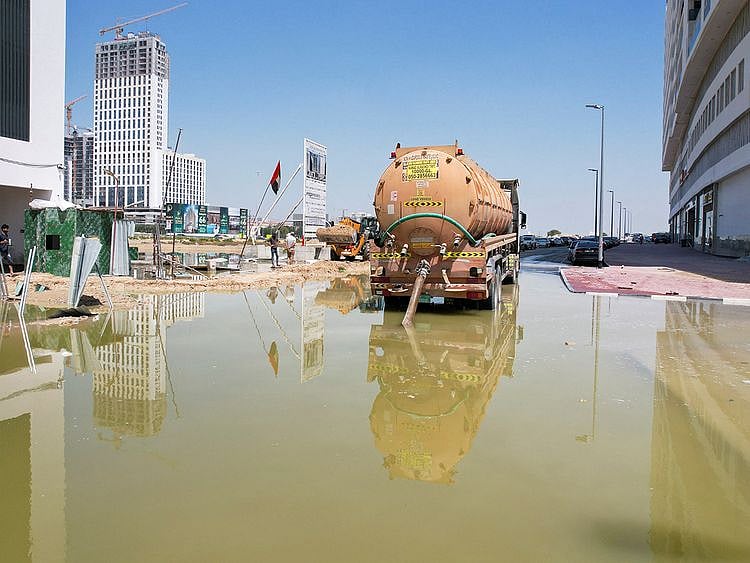UAE eradicating mosquito breeding ‘hot spots’ after heavy rains
Environment ministry, crisis authority and municipalities target water pools, damp areas

Dubai: The Ministry of Climate Change and Environment (MOCCAE) on Saturday announced the intensification of efforts for the third phase of the Anti-Mosquito Campaign, in collaboration with the National Emergency, Crisis and Disaster Management Authority (NCEMA), and in partnership with relevant local authorities across the UAE, including municipalities in different emirates.
The third phase of the campaign is part of the commitment to eradicating mosquito breeding “hotspots”. It aims to minimise mosquito infestation across various locations across the country, especially with the country experiencing higher rates of rainfall recently, which increases the spread of mosquitoes in water pools and damp areas.
Also Read
Dubai Municipality: Top tips to combat mosquito proliferation after rainfallDoctors warn of health risks, provide preventive tips after heavy rains in UAESharjah: How flood-affected homeowners can apply for aidThe campaign launched its first phase in February 2022, and the current phase, which is part of the efforts to eliminate mosquito breeding grounds and reduce their spread in various locations and places, will continue until May 2025.
The Ministry, in collaboration with the relevant authorities, said it is conducting thorough investigations and monitoring hotspots where mosquitoes are prevalent.
Alia Abdul Rahim Al Harmoudi, Assistant Undersecretary for the Sustainable Communities Sector at MOCCAE, stated that mosquito control efforts represent one of the ministry’s main targets during this period, affirming that the ministry will work in the coming period to provide all necessary information, guidance, and support to the community to help reduce the spread of mosquitoes through available communication channels.
Dr Saif Juma Al Dhaheri, director of the National Operations Center of NCEMA, emphasised the importance of national integration in combating biological challenges and close cooperation between relevant entities in the country at both national and local levels, enhancing the ability to address health risks and protect the community. He pointed out that the national campaign focuses on several aspects such as prevention and control, health awareness and education, and eliminating mosquito breeding sites.
Othaibah Saeed AlQaydi, director of Municipal Affairs Management at the MOCCAE, said that the ministry is keen on using the latest and best technical solutions to combat mosquitoes and reduce their spread, along with disseminating preventive measures with safety precautions to minimise their spread. She affirmed that everything used in this campaign is safe and non-harmful to humans or animals, and only targets the eradication of mosquitoes.
24/7 control measures
In Dubai, Adel Al Karrani, Director of the Public Health Services Department in Dubai Municipality, stated that the Municipality’s teams have been tirelessly working around the clock to control the spread of mosquitoes across all residential, commercial, and industrial areas, water bodies, parks, markets, drainage areas, and numerous other locations in Dubai.
Al Karrani said: “Dubai Municipality has successfully carried out extensive disinfection and sterilization operations after the rainstorm during the end of April. Focused on 102 water collection sites and over 75,000 drainage outlets, these campaigns seek to control the breeding of mosquito larvae. Bacterial capsules are being used for larval control, alongside spray and smoke pesticides for adult mosquitoes. Furthermore, mosquito traps have been strategically placed, along with the application of 511 liters of liquid pesticides and 391kg of solid pesticides.”
National biosecurity meeting
Meanwhile, on Saturday, the National Committee of Biosecurity held its second meeting for 2024 covering a wide range of critical topics to enhance the biosecurity in the UAE.
The committee placed particular emphasis on the need to strengthen mosquito control efforts, particularly following the “extraordinary climatic event” that resulted in record-breaking rainfall in the country. The committee also discussed Epidemic Preparedness Map Project and National Biosecurity Framework.
Dr Amna bint Abdullah Al Dahak Al Shamsi, Minister of Climate Change and the Environment, chaired the second meeting of the National Committee of Biosecurity, which was held virtually.
She said: “We are working to ensure sustainable national biosecurity in all the emirates, with special focus on efforts to control mosquito proliferation, especially following the exceptional weather conditions in the country. We will take all necessary steps in collaboration with the relevant authorities to accomplish this goal and remain committed to the cause going forward.”
The meeting also discussed other important topics in the field of biosecurity in the UAE, including updates on the execution of the ‘National Biosecurity Framework 2023-2032’ and the ongoing efforts to expedite the implementation of its requirements in collaboration with the National Committee of Biosecurity on several key files.
Sign up for the Daily Briefing
Get the latest news and updates straight to your inbox
Network Links
GN StoreDownload our app
© Al Nisr Publishing LLC 2026. All rights reserved.